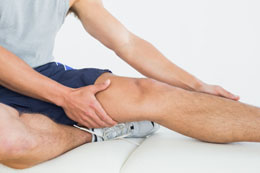The problem of severe leg pain can arise due to leg injuries, contractions of the leg muscles, and many other underlying health complications. In this article, we have highlighted the probable causes of severe pain in the legs.

Our legs are an extremely important part of our body, as they help us in moving around. When there is severe leg pain, then it can badly affect our daily activities. There are 3 different bones in the leg, namely, the femur, tibia, and fibula. If any of these bones get injured, it results in leg pain. The health problems that contribute towards leg pain are: strain in muscles or nerves, clotting of blood, tumor growth, improper circulation of blood, dehydration, deficiency of essential minerals in the body, diseases, weakness and muscle fatigue, etc.
Probable Causes
There are several causes of severe leg pain. Some of the causes are serious and need immediate medical attention, and others are minor problems that can be treated at home itself. Following are the main factors that lead to leg pain.
✔
Leg Cramps
Severe leg cramps occur due to muscle contraction in the legs, which makes them taut and inflexible. Muscles of the thigh, foot, and calf experience this kind of cramps. Usually, they occur during the night and disturb the sleep. Though people of any age group can get afflicted with cramps, it is more common in elderly and middle-aged people. It happens due to dehydration, deficiency of minerals, like calcium; potassium; and magnesium, or overuse of the muscles. Diseases like peripheral artery disease, Parkinson's disease, and Addison's disease can also give rise to leg cramps.
✔
Varicose Veins
The function of the veins is to carry deoxygenated blood from various parts of the body to the heart. The veins consist of valves that facilitate the flow of blood in one direction only. If there is some defect in the valves, then the impure blood starts flowing in the wrong direction. This results in the pooling of blood inside the veins, which in turn causes it to swell up. This problem is referred to as varicose veins, and it usually affects the veins of the legs. As a result, one can suffer from severe pain in the legs. It is mostly observed in women. Standing for long hours and pregnancy are the most common factors that lead to varicose veins.
✔
Tendinitis
The muscles are attached to the bones with the help of a connective tissue called tendons. When there is a swelling of the tendons near the knee or heel joint, it can lead to tendinitis. As a result, one may suffer from pain in the night, which may aggravate due to certain movements. It can be caused due to an injury and overuse or degeneration of the tendons. People suffering from diseases like rheumatoid arthritis or diabetes can also develop this problem.
✔
Shin Splints
This condition gives a sharp pain in the front part of the lower legs. It is usually experienced after doing some exercises. In some severe cases, pain can be felt even when at rest. This kind of pain in both the legs is more common in those who start exercising after a period of inactivity. It is commonly observed in athletes. Sometimes, it could be serious.
✔
Fracture
There are two forms of fracture in the leg bones. One is the hairline fracture, which is a minor break, and the other is a compound fracture, which is quite severe as the broken bone tends to thrust out of the skin. In both these conditions, one suffers from severe pain. However, this pain is accompanied by swelling in the fractured region.
When severe leg pain is accompanied by swelling or reddening of the legs, fever, and blue or black patches on the leg, then you should refer to a doctor for treatment. If you suffer from pain frequently due to overuse, then you should take some steps for pain management. Eat foods like fresh fruits, green vegetables, milk, cheese, etc., to supply essential vitamins and minerals to the body. Drink adequate water in order to prevent muscle contractions. Leg stretching exercises can make the leg muscles flexible. Give rest to your feet in between your work so that they do not get overworked. Frequent leg cramps at night can be relieved with massage and application of hot compression. Take care!
Disclaimer: This Buzzle article is for informative purposes only and should not be used as a replacement for expert medical advice.


 Our legs are an extremely important part of our body, as they help us in moving around. When there is severe leg pain, then it can badly affect our daily activities. There are 3 different bones in the leg, namely, the femur, tibia, and fibula. If any of these bones get injured, it results in leg pain. The health problems that contribute towards leg pain are: strain in muscles or nerves, clotting of blood, tumor growth, improper circulation of blood, dehydration, deficiency of essential minerals in the body, diseases, weakness and muscle fatigue, etc.
Our legs are an extremely important part of our body, as they help us in moving around. When there is severe leg pain, then it can badly affect our daily activities. There are 3 different bones in the leg, namely, the femur, tibia, and fibula. If any of these bones get injured, it results in leg pain. The health problems that contribute towards leg pain are: strain in muscles or nerves, clotting of blood, tumor growth, improper circulation of blood, dehydration, deficiency of essential minerals in the body, diseases, weakness and muscle fatigue, etc.